The Best 10 Alternatives to HashiCorp Vault (+ Pricing & Reviews)
Twingate Team
•
•
Jul 27, 2024

HashiCorp Vault is an identity-based secrets management tool designed to manage access to secrets and protect sensitive data. It centrally stores, accesses, and distributes secrets programmatically, manages certificates and keys, and provides encryption as a service. However, it might not be the choice for everyone. This article explores the importance of managing access to secrets and preventing credentials from falling into the wrong hands through identity-based security measures.

10 Alternatives to HashiCorp Vault
1. BeyondTrust
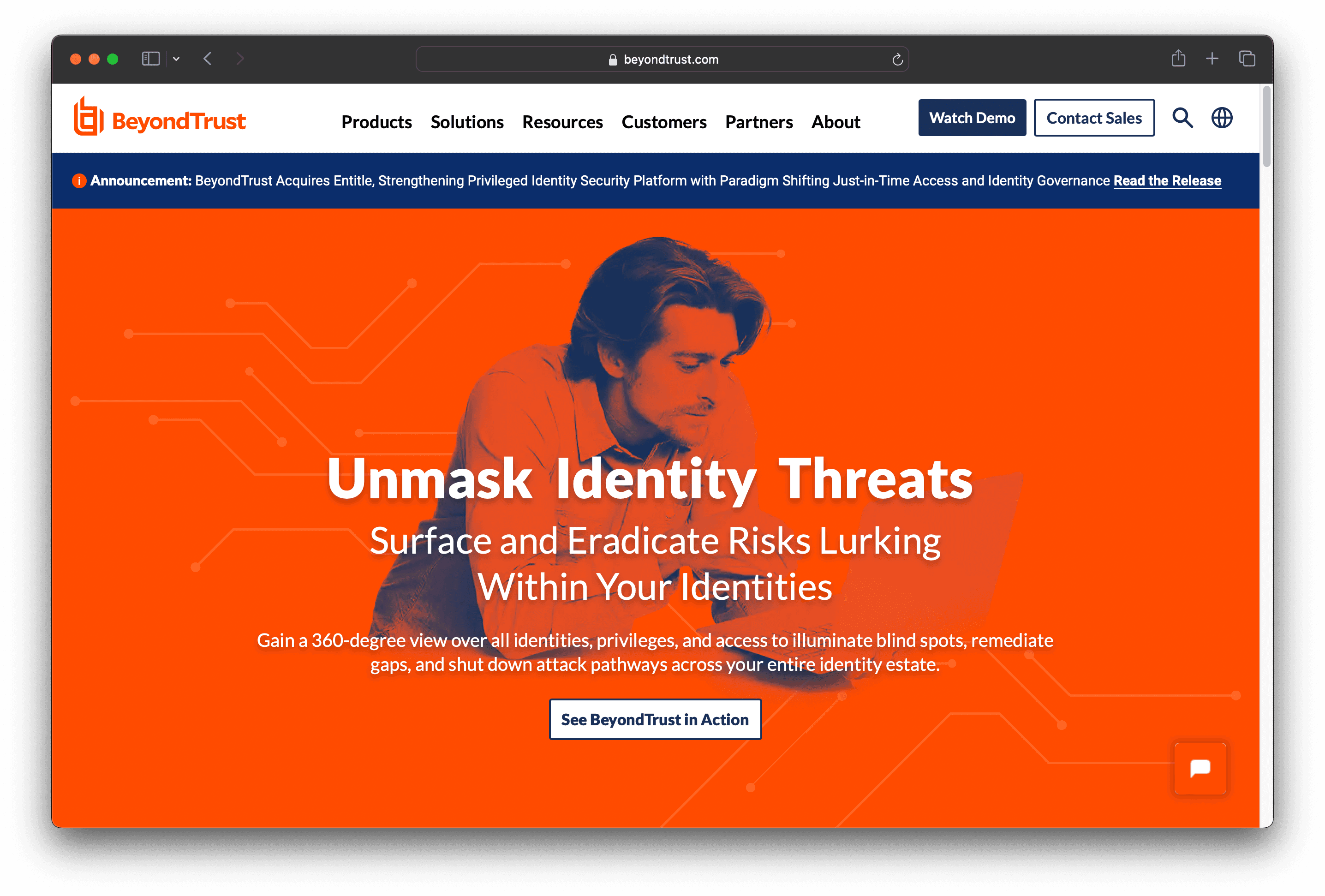
BeyondTrust is a security solution focused on identity and access management, offering comprehensive tools for privileged access management (PAM). It aims to secure and manage access to critical systems and data, ensuring robust protection against unauthorized access. BeyondTrust is designed for scalability and ease of use, catering to businesses of all sizes.
BeyondTrust Pricing
BeyondTrust's pricing is not public. Contact their support for more info.
BeyondTrust Reviews
BeyondTrust has an overall rating of 4.7 out of 5 stars based on 340 reviews. Users appreciate its robust security and ease of use. Check out more of our reviews here!
Pros and Cons of BeyondTrust
Pros:
Recognized as a leader in identity security by Gartner, Forrester, and KuppingerCole, ensuring top-tier industry credibility.
Offers holistic visibility and simplified management, making it easier to protect against identity-based threats.
Extensive library of whitepapers, webinars, and blogs to educate and support customers, enhancing user experience.
Cons:
The comprehensive nature of the solutions might be overwhelming for smaller organizations or those with less mature security postures.
Implementing and managing BeyondTrust's solutions may require significant resources and expertise, posing a challenge for some businesses.
High level of service and advanced features might come with a premium price tag, potentially limiting accessibility for smaller businesses.
2. Cyberark
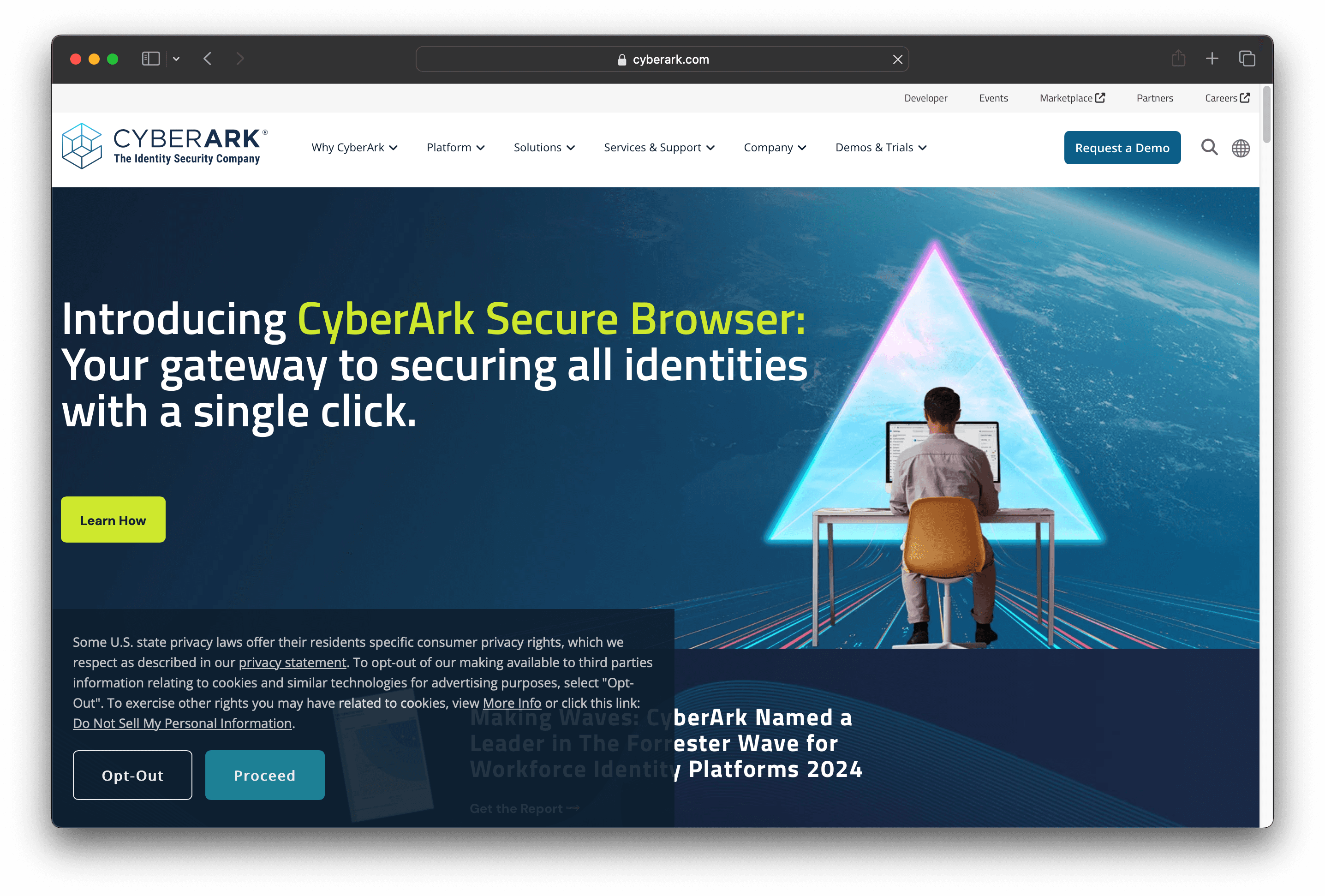
CyberArk is a security platform focused on protecting identities across hybrid, SaaS, and multi-cloud environments. It offers solutions like access management, privileged access management, and secrets management. Designed for scalability and ease of use, CyberArk aims to secure both human and machine identities effectively.
Cyberark Pricing
Cyberark's pricing is not public. Contact their support for more info.
Cyberark Reviews
Cyberark has an overall rating of 4.4 out of 5 stars based on 64 reviews. Users appreciate its security features and ease of use. Check out more of our reviews here!
Pros and Cons ofCyberark
Pros:
Comprehensive Identity Security: CyberArk secures identities across hybrid, SaaS, and multi-cloud environments, ensuring robust protection.
Intelligent Privilege Controls: Offers tailored privilege controls for workforce users, third-party vendors, and machine identities.
Flexible Automation and Orchestration: Streamlines HR processes, ensures compliance, and improves efficiencies with automation capabilities.
Cons:
Complexity: The platform's comprehensive nature may require significant time and expertise to implement and manage effectively.
Cost: Advanced features and extensive capabilities might come at a higher cost, posing a barrier for smaller organizations.
Learning Curve: Users may need extensive training and support to fully leverage the platform's sophisticated capabilities.
3. StrongDM
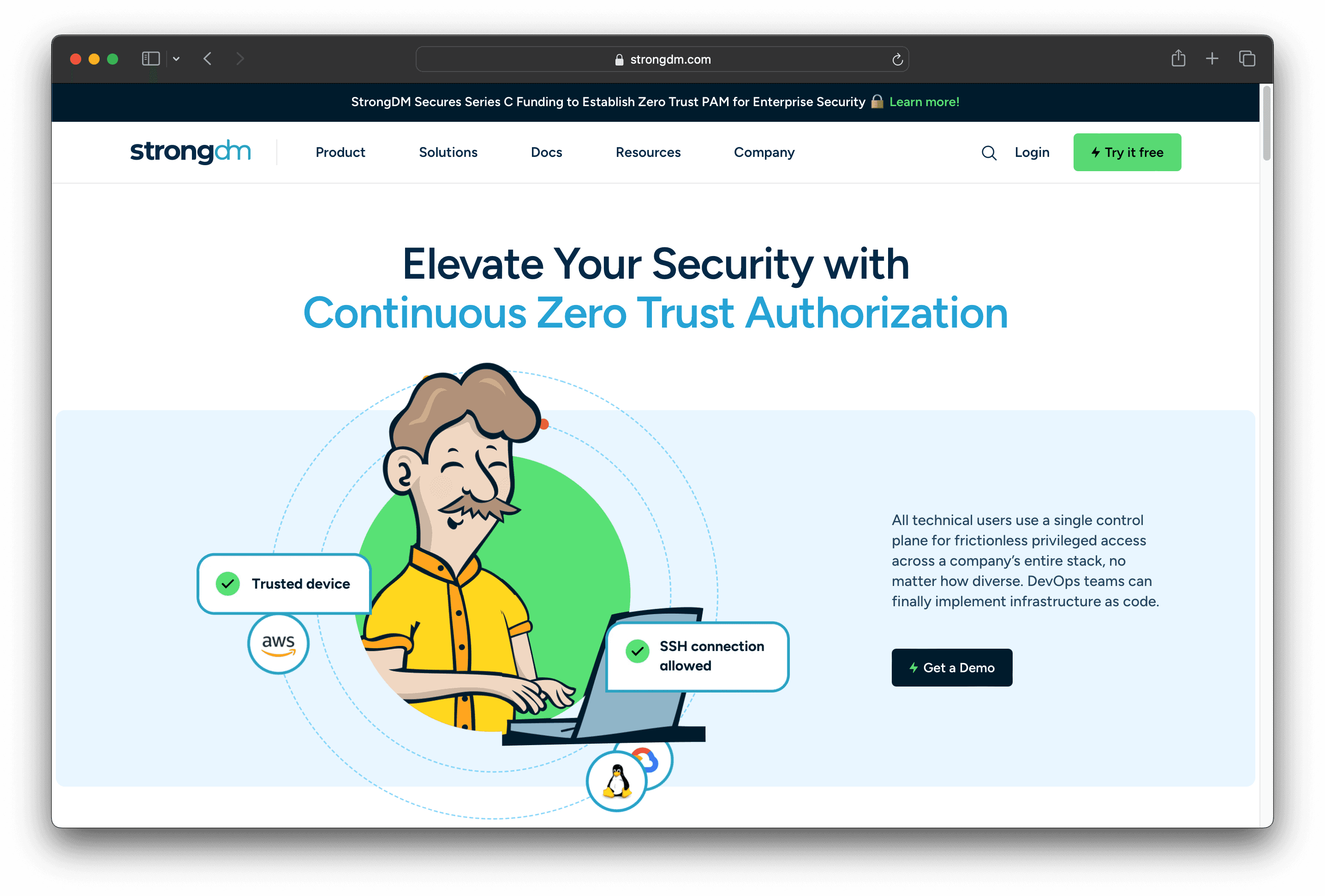
StrongDM is a Zero Trust Privileged Access Management solution that simplifies and secures access across a company's tech stack. Designed for ease of use, it provides a single control plane for technical users, particularly DevOps teams, enabling seamless infrastructure management without the need for migration or coding.
StrongDM Pricing
StrongDM's pricing is not public. Contact their support for more info.
StrongDM Reviews
StrongDM has an overall rating of 4.7 out of 5 stars based on 81 reviews. Users appreciate its ease of use and responsive support. Check out more of our reviews here!
Pros and Cons of StrongDM
Pros:
Ease of Use: Users consistently praise StrongDM for its intuitive interface, making it accessible even for those less familiar with data security software.
Customer Support: StrongDM's responsive and helpful support team is frequently highlighted, ensuring users can quickly resolve any issues.
Access Control: The platform offers robust access control features, allowing for precise management of who can access what, enhancing overall security.
Cons:
Audit Logging Issues: Some users have reported occasional problems with audit logging, which can impact tracking and compliance efforts.
Poor User Interface: A few users find the user interface lacking in certain areas, which can hinder the overall user experience.
Expensive: The cost of StrongDM can be a barrier for smaller organizations, making it less accessible to all potential users.
4. Teleport
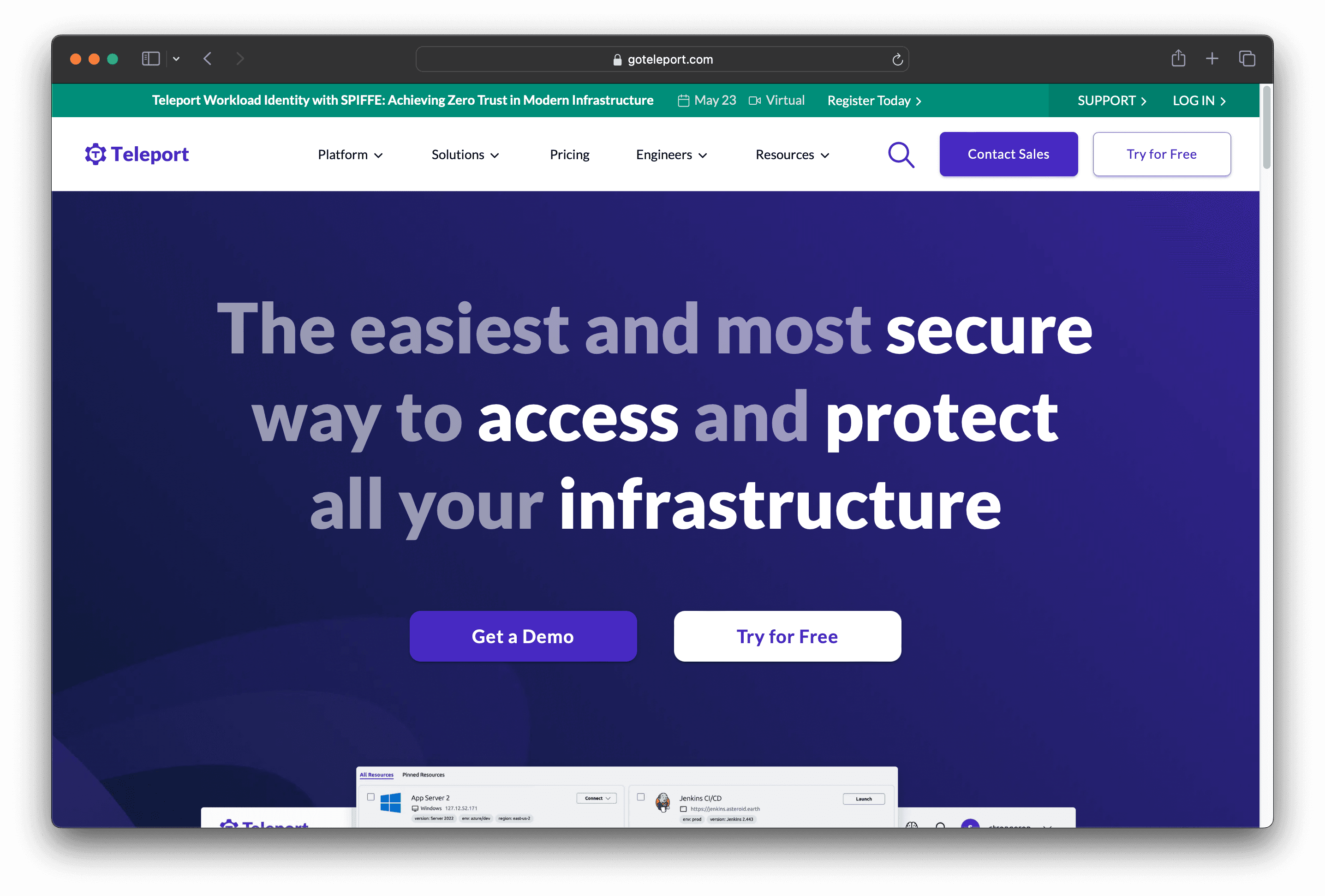
Teleport is a platform designed to provide secure and easy access to infrastructure, eliminating the need for passwords, secrets, and VPNs. It focuses on improving efficiency, fortifying infrastructure, and simplifying compliance. Teleport offers on-demand, least privileged access with cryptographic identity and zero trust security.
Teleport Pricing
Teleport's pricing is not public. Contact their support for more info.
Teleport Reviews
Teleport has an overall rating of 4.5 out of 5 stars based on 104 reviews. Users appreciate its security features and ease of use. Check out more of our reviews here!
Pros and Cons of Teleport
Pros:
Ease of Use: Teleport is praised for its intuitive interface, making it accessible even for those less familiar with data security software.
Security: Built on cryptographic identity and zero trust principles, Teleport ensures robust protection against unauthorized access.
On-Demand Access: Provides least-privileged access on demand, enhancing security while maintaining operational efficiency.
Cons:
Complexity for New Users: The platform may have a learning curve for junior engineers not familiar with SSH and modern access methods.
Organizational Change: Transitioning from traditional methods like VPNs to Teleport's model may require significant changes in processes and training.
Dependence on Identity Providers: Reliance on identity providers means any compromise in these providers could impact security, despite mitigation features.
5. Arcon PAM
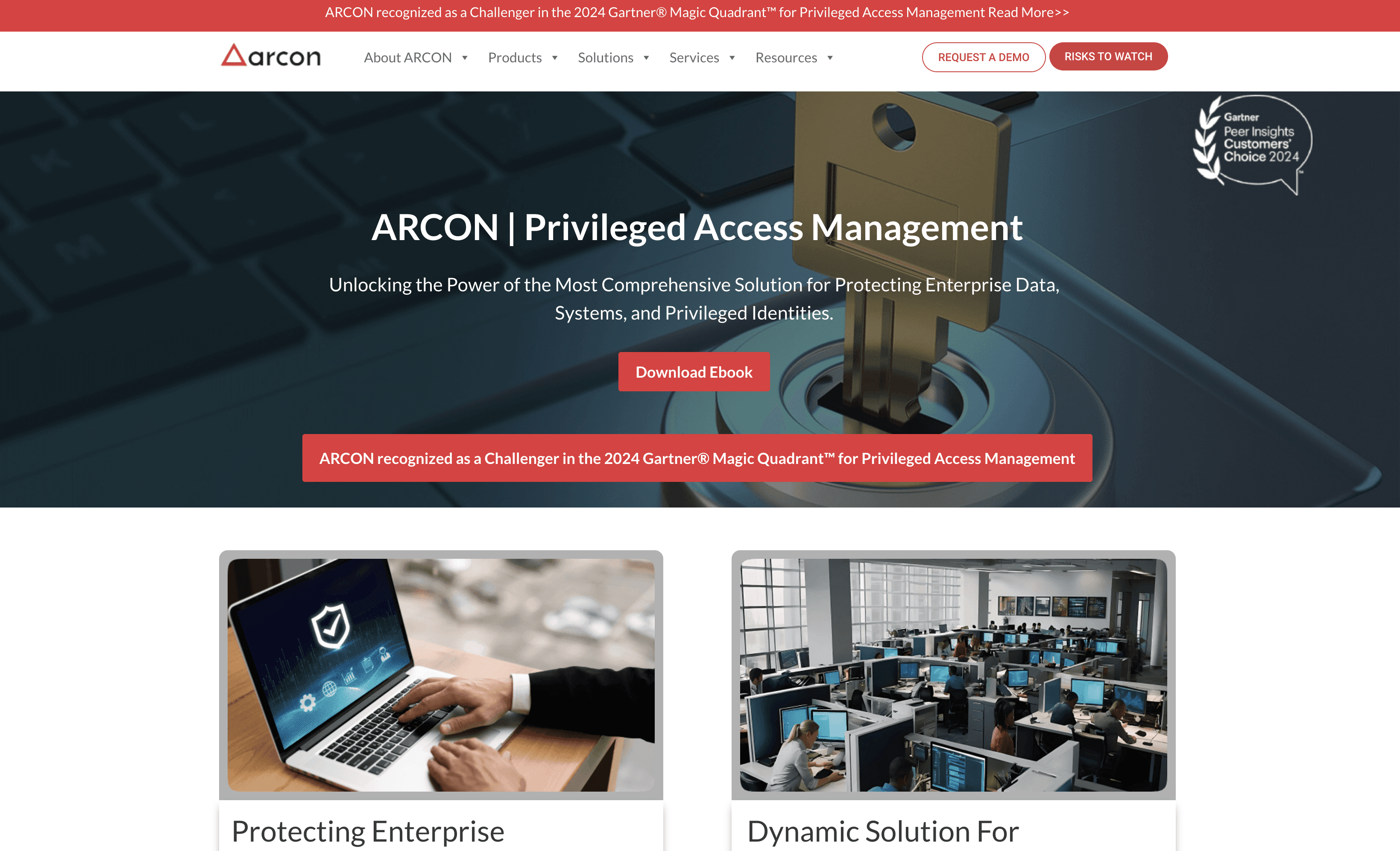
Arcon PAM is a security solution designed to manage and control privileged access across an organization's IT infrastructure. It offers granular access control, ensuring that only authorized users can access sensitive systems. With a focus on security and compliance, Arcon PAM aims to protect against unauthorized access and data breaches.
Arcon PAM Pricing
Arcon PAM's pricing is not public. Contact their support for more info.
Arcon PAM Reviews
Arcon PAM has an overall rating of 4.3 out of 5 stars based on 23 reviews. Users appreciate its security features and monitoring tools. Check out more of our reviews here!
Pros and Cons of Arcon PAM
Pros:
Comprehensive Solution: Extensive technology integrations and scalability ensure robust security for high-value systems and data.
Dynamic Capabilities: Offers just-in-time access, adaptive authentication, and extensive integration for DevOps use cases.
Core Features: Includes multifactor authentication, single sign-on, access control, and session management.
Cons:
Complexity: The solution's comprehensive nature might require significant effort and expertise to implement and manage.
Resource Intensive: Implementations can be resource-hungry, leading to longer deployment times and higher initial costs.
Customization Needs: Customizing the system to specific organizational needs may require additional time and resources.
6. Krontech Single Connect

Krontech Single Connect is a security solution designed to manage and control privileged access across IT infrastructures. It offers fast deployment, high security, and operational efficiency, making it ideal for enterprises and telecommunications companies. The platform ensures secure access, configuration control, and activity recording in data centers or network infrastructures.
Krontech Single Connect Pricing
Krontech Single Connect's pricing is not public. Contact their support for more info.
Krontech Single Connect Reviews
Krontech Single Connect has an overall rating of 4.5 out of 5 stars based on 1 review. Users appreciate its accessibility and security features. Check out more of our reviews here!
Pros and Cons of Krontech Single Connect
Pros:
Fast Deployment: Krontech Single Connect is renowned for its rapid deployment, making it one of the quickest PAM solutions to implement.
Comprehensive Security: The platform offers robust security features, ensuring IT operations are well-protected against unauthorized access.
Operational Efficiency: Enhances efficiency by providing unified management of access control, configuration, and activity recording.
Cons:
User Interface: Some users have reported that the interface can be laggy, which may hinder the overall user experience.
Complexity: The comprehensive nature of the solution might require significant effort and expertise to implement and manage effectively.
Resource Intensive: Implementations can be resource-hungry, leading to longer deployment times and higher initial costs.
7. Foxpass
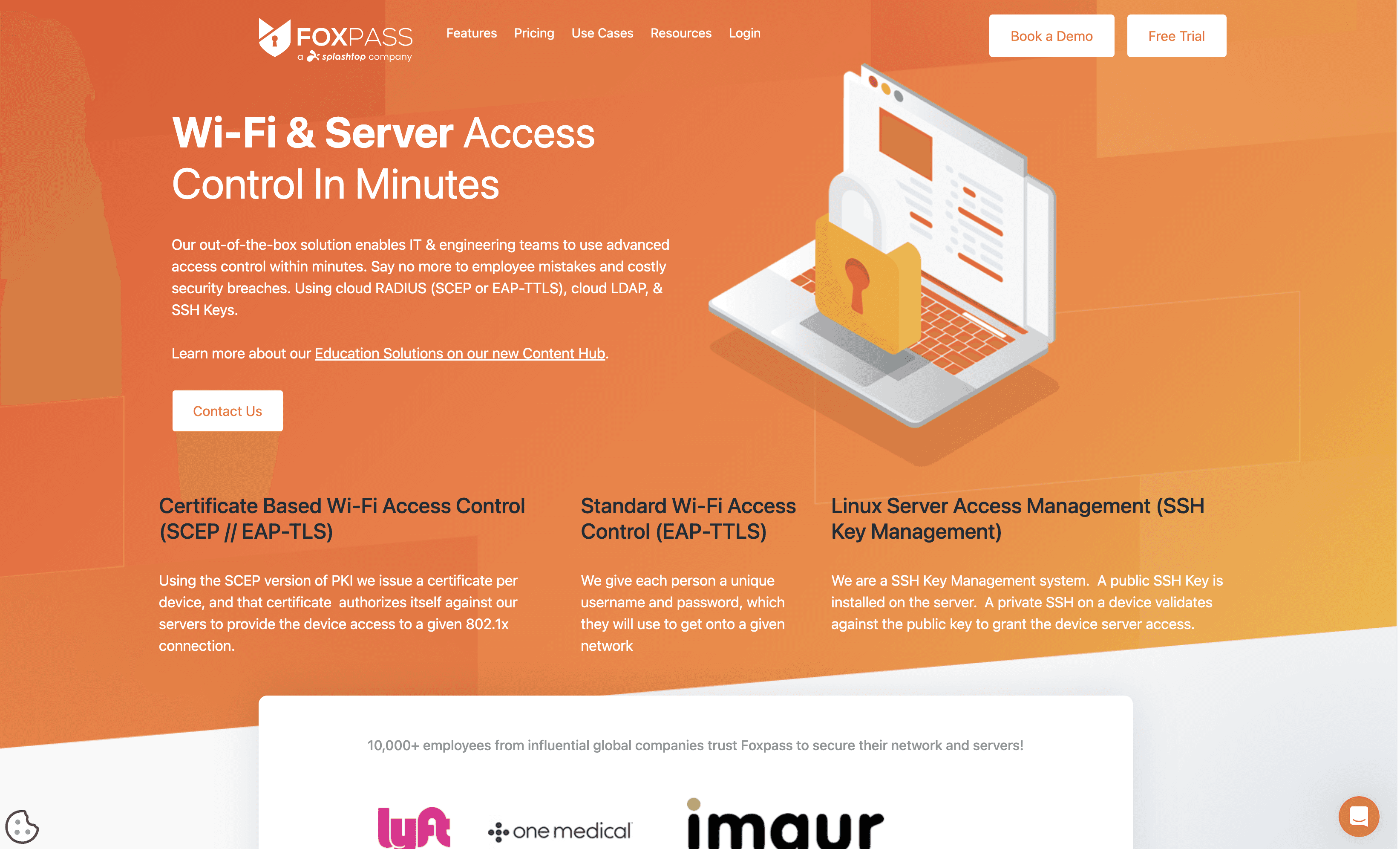
Foxpass is a cloud-based authentication service offering Cloud RADIUS and Cloud LDAP servers to enhance security and access control. It integrates seamlessly with existing systems, simplifying traditionally complex protocols. Designed for IT and engineering teams, Foxpass ensures secure, efficient, and reliable access management.
Foxpass Pricing
Foxpass's pricing is not public. Contact their support for more info.
Foxpass Reviews
Foxpass has an overall rating of 4.8 out of 5 stars based on 34 reviews. Users praise its technical support and integration capabilities. Check out more of our reviews here!
Pros and Cons of Foxpass
Pros:
Excellent Technical Support: Users highlight exceptional support, including live video tech support and personal calls to resolve issues.
Ease of Use: Appreciated for its simplicity and minimal effort required, especially compared to other solutions like Active Directory.
Integration Capabilities: Integrates well with other authentication systems such as G Suite, Okta, and AWS.
Cons:
User Interface: Some users find the UI and UX to be a bit clunky and unpolished, affecting overall user experience.
Learning Curve: A few users mentioned that it took some time to get the hang of using Foxpass, indicating a need for improved user-friendliness.
Log Filters: There are requests for better log filtering capabilities, which could enhance usability and efficiency.
8. Okta ASA

Okta ASA is a security solution designed to provide secure access to infrastructure without the need for traditional passwords or VPNs. It focuses on improving efficiency and simplifying compliance through a zero-trust security model, making it ideal for businesses of all sizes.
Okta ASA Pricing
Okta ASA's pricing is not public. Contact their support for more info.
Okta ASA Reviews
Okta ASA has an overall rating of 4.5 out of 5 stars based on 869 reviews. Users appreciate its security features and ease of use. Check out more of our reviews here!
Pros and Cons of Okta ASA
Pros:
Rock-Solid Security: Okta ASA offers robust security features, ensuring protection against unauthorized access.
Passwordless Experience: Promotes a seamless, passwordless user experience, enhancing convenience and security.
Comprehensive Identity Solutions: Covers both customer identity and workforce identity needs, providing a holistic approach.
Cons:
Complexity in Implementation: The solution can be complex to implement, requiring significant time and resources.
Cost for Larger Organizations: While entry-level pricing is affordable, costs can escalate for larger organizations.
Customization Limitations: Some users might find limitations in customization options to fit specific business needs.
9. JumpCloud
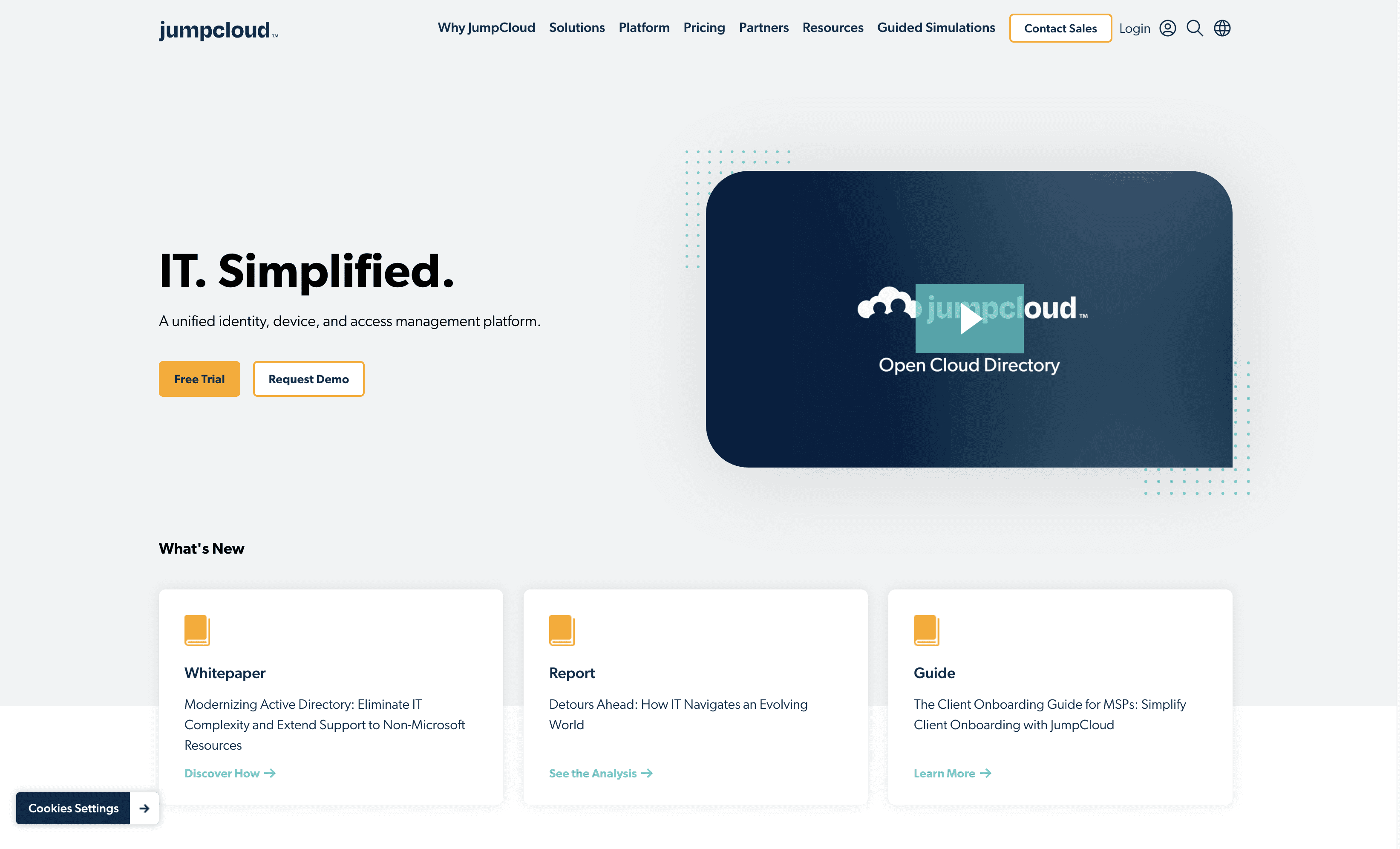
JumpCloud is a unified identity, device, and access management platform designed to simplify IT operations. It offers a comprehensive suite of features, including cloud directory, multi-factor authentication, and single sign-on, making it ideal for businesses seeking streamlined and secure IT management.
JumpCloud Pricing
Device Management: $9/user/month billed annually or $11/month billed monthly.
SSO: $11/user/month billed annually or $13/month billed monthly.
Core Directory: $13/user/month billed annually or $15/month billed monthly.
Platform: $19/user/month billed annually or $22/month billed monthly.
Platform Prime: $24/user/month billed annually or $27/month billed monthly.
JumpCloud Reviews
JumpCloud has an overall rating of 4.5 out of 5 stars based on 2,798 reviews. Users appreciate its ease of use and comprehensive device management. Check out more of our reviews here!
Pros and Cons of JumpCloud
Pros:
Unified Management: JumpCloud offers a single platform for managing identities, devices, and access, streamlining IT operations.
Secure Access: Ensures secure, frictionless access for users, enhancing overall security and user experience.
Customer Testimonials: Positive feedback from users highlights scalability, IT infrastructure backbone, and cost savings.
Cons:
Complexity for New Users: The wide range of features might be overwhelming for those new to the platform.
Cost: Enterprise-level solutions can sometimes be costly, potentially limiting accessibility for smaller organizations.
Integration Challenges: Integrating JumpCloud with existing IT infrastructure might present challenges.
10. ManageEngine PAM360
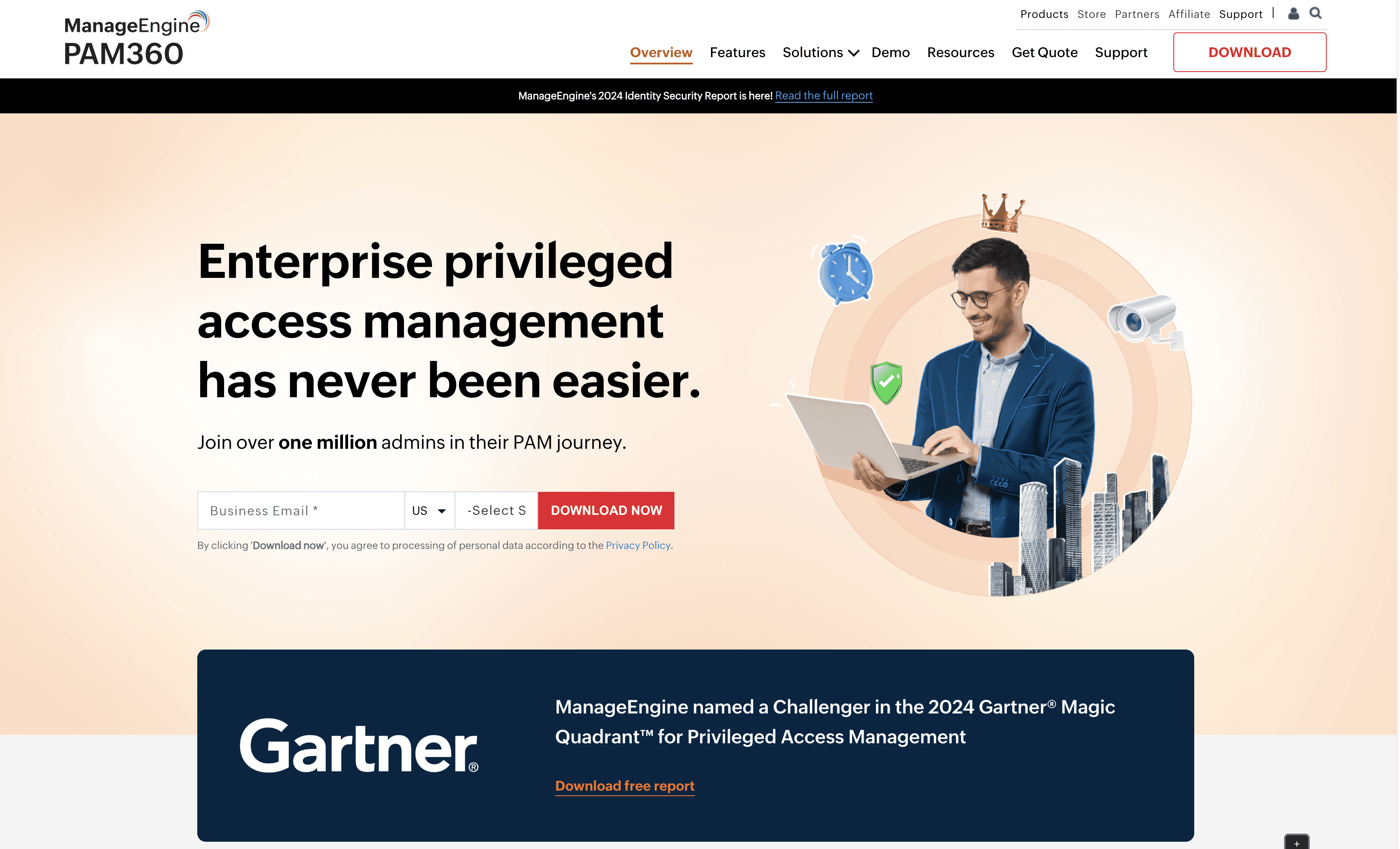
ManageEngine PAM360 is an enterprise Privileged Access Management (PAM) solution designed to simplify and secure privileged access across IT infrastructures. It offers features like session management, privilege elevation, and secrets management, making it ideal for organizations seeking robust security and compliance. PAM360 ensures ease of deployment and comprehensive protection.
ManageEngine PAM360 Pricing
ManageEngine PAM360's pricing is not public. Contact their support for more info.
ManageEngine PAM360 Reviews
ManageEngine PAM360 has an overall rating of 4.5 out of 5 stars based on 1 review. Users appreciate its ease of management and deployment. Check out more of our reviews here!
Pros and Cons of ManageEngine PAM360
Pros:
Comprehensive Feature Set: Includes essential PAM controls like PASM, PEDM, and cloud infrastructure entitlements management.
Compliance Ready: Meets standards like NIST, PCI-DSS, FISMA, HIPAA, SOX, and ISO-IEC 27001.
User-Friendly and Easy to Deploy: Known for its intuitive UI and flexible deployment options.
Cons:
Complexity for Small Businesses: Extensive features might overwhelm smaller organizations with simpler needs.
Learning Curve: Despite a user-friendly interface, the tool's comprehensive nature may require a learning period.
Potential Overhead: Managing and maintaining a full-stack PAM solution could require significant resources and expertise.
Looking to secure your technical infrastructure?
Twingate offers granular access controls and deployment automations to protect your VPC environment. By leveraging Zero Trust security tools, Twingate ensures that private resources and internet traffic remain secure in the modern world of work. Try Twingate for Free today!
Rapidly implement a modern Zero Trust network that is more secure and maintainable than VPNs.
The Best 10 Alternatives to HashiCorp Vault (+ Pricing & Reviews)
Twingate Team
•
•
Jul 27, 2024

HashiCorp Vault is an identity-based secrets management tool designed to manage access to secrets and protect sensitive data. It centrally stores, accesses, and distributes secrets programmatically, manages certificates and keys, and provides encryption as a service. However, it might not be the choice for everyone. This article explores the importance of managing access to secrets and preventing credentials from falling into the wrong hands through identity-based security measures.

10 Alternatives to HashiCorp Vault
1. BeyondTrust

BeyondTrust is a security solution focused on identity and access management, offering comprehensive tools for privileged access management (PAM). It aims to secure and manage access to critical systems and data, ensuring robust protection against unauthorized access. BeyondTrust is designed for scalability and ease of use, catering to businesses of all sizes.
BeyondTrust Pricing
BeyondTrust's pricing is not public. Contact their support for more info.
BeyondTrust Reviews
BeyondTrust has an overall rating of 4.7 out of 5 stars based on 340 reviews. Users appreciate its robust security and ease of use. Check out more of our reviews here!
Pros and Cons of BeyondTrust
Pros:
Recognized as a leader in identity security by Gartner, Forrester, and KuppingerCole, ensuring top-tier industry credibility.
Offers holistic visibility and simplified management, making it easier to protect against identity-based threats.
Extensive library of whitepapers, webinars, and blogs to educate and support customers, enhancing user experience.
Cons:
The comprehensive nature of the solutions might be overwhelming for smaller organizations or those with less mature security postures.
Implementing and managing BeyondTrust's solutions may require significant resources and expertise, posing a challenge for some businesses.
High level of service and advanced features might come with a premium price tag, potentially limiting accessibility for smaller businesses.
2. Cyberark

CyberArk is a security platform focused on protecting identities across hybrid, SaaS, and multi-cloud environments. It offers solutions like access management, privileged access management, and secrets management. Designed for scalability and ease of use, CyberArk aims to secure both human and machine identities effectively.
Cyberark Pricing
Cyberark's pricing is not public. Contact their support for more info.
Cyberark Reviews
Cyberark has an overall rating of 4.4 out of 5 stars based on 64 reviews. Users appreciate its security features and ease of use. Check out more of our reviews here!
Pros and Cons ofCyberark
Pros:
Comprehensive Identity Security: CyberArk secures identities across hybrid, SaaS, and multi-cloud environments, ensuring robust protection.
Intelligent Privilege Controls: Offers tailored privilege controls for workforce users, third-party vendors, and machine identities.
Flexible Automation and Orchestration: Streamlines HR processes, ensures compliance, and improves efficiencies with automation capabilities.
Cons:
Complexity: The platform's comprehensive nature may require significant time and expertise to implement and manage effectively.
Cost: Advanced features and extensive capabilities might come at a higher cost, posing a barrier for smaller organizations.
Learning Curve: Users may need extensive training and support to fully leverage the platform's sophisticated capabilities.
3. StrongDM

StrongDM is a Zero Trust Privileged Access Management solution that simplifies and secures access across a company's tech stack. Designed for ease of use, it provides a single control plane for technical users, particularly DevOps teams, enabling seamless infrastructure management without the need for migration or coding.
StrongDM Pricing
StrongDM's pricing is not public. Contact their support for more info.
StrongDM Reviews
StrongDM has an overall rating of 4.7 out of 5 stars based on 81 reviews. Users appreciate its ease of use and responsive support. Check out more of our reviews here!
Pros and Cons of StrongDM
Pros:
Ease of Use: Users consistently praise StrongDM for its intuitive interface, making it accessible even for those less familiar with data security software.
Customer Support: StrongDM's responsive and helpful support team is frequently highlighted, ensuring users can quickly resolve any issues.
Access Control: The platform offers robust access control features, allowing for precise management of who can access what, enhancing overall security.
Cons:
Audit Logging Issues: Some users have reported occasional problems with audit logging, which can impact tracking and compliance efforts.
Poor User Interface: A few users find the user interface lacking in certain areas, which can hinder the overall user experience.
Expensive: The cost of StrongDM can be a barrier for smaller organizations, making it less accessible to all potential users.
4. Teleport

Teleport is a platform designed to provide secure and easy access to infrastructure, eliminating the need for passwords, secrets, and VPNs. It focuses on improving efficiency, fortifying infrastructure, and simplifying compliance. Teleport offers on-demand, least privileged access with cryptographic identity and zero trust security.
Teleport Pricing
Teleport's pricing is not public. Contact their support for more info.
Teleport Reviews
Teleport has an overall rating of 4.5 out of 5 stars based on 104 reviews. Users appreciate its security features and ease of use. Check out more of our reviews here!
Pros and Cons of Teleport
Pros:
Ease of Use: Teleport is praised for its intuitive interface, making it accessible even for those less familiar with data security software.
Security: Built on cryptographic identity and zero trust principles, Teleport ensures robust protection against unauthorized access.
On-Demand Access: Provides least-privileged access on demand, enhancing security while maintaining operational efficiency.
Cons:
Complexity for New Users: The platform may have a learning curve for junior engineers not familiar with SSH and modern access methods.
Organizational Change: Transitioning from traditional methods like VPNs to Teleport's model may require significant changes in processes and training.
Dependence on Identity Providers: Reliance on identity providers means any compromise in these providers could impact security, despite mitigation features.
5. Arcon PAM

Arcon PAM is a security solution designed to manage and control privileged access across an organization's IT infrastructure. It offers granular access control, ensuring that only authorized users can access sensitive systems. With a focus on security and compliance, Arcon PAM aims to protect against unauthorized access and data breaches.
Arcon PAM Pricing
Arcon PAM's pricing is not public. Contact their support for more info.
Arcon PAM Reviews
Arcon PAM has an overall rating of 4.3 out of 5 stars based on 23 reviews. Users appreciate its security features and monitoring tools. Check out more of our reviews here!
Pros and Cons of Arcon PAM
Pros:
Comprehensive Solution: Extensive technology integrations and scalability ensure robust security for high-value systems and data.
Dynamic Capabilities: Offers just-in-time access, adaptive authentication, and extensive integration for DevOps use cases.
Core Features: Includes multifactor authentication, single sign-on, access control, and session management.
Cons:
Complexity: The solution's comprehensive nature might require significant effort and expertise to implement and manage.
Resource Intensive: Implementations can be resource-hungry, leading to longer deployment times and higher initial costs.
Customization Needs: Customizing the system to specific organizational needs may require additional time and resources.
6. Krontech Single Connect

Krontech Single Connect is a security solution designed to manage and control privileged access across IT infrastructures. It offers fast deployment, high security, and operational efficiency, making it ideal for enterprises and telecommunications companies. The platform ensures secure access, configuration control, and activity recording in data centers or network infrastructures.
Krontech Single Connect Pricing
Krontech Single Connect's pricing is not public. Contact their support for more info.
Krontech Single Connect Reviews
Krontech Single Connect has an overall rating of 4.5 out of 5 stars based on 1 review. Users appreciate its accessibility and security features. Check out more of our reviews here!
Pros and Cons of Krontech Single Connect
Pros:
Fast Deployment: Krontech Single Connect is renowned for its rapid deployment, making it one of the quickest PAM solutions to implement.
Comprehensive Security: The platform offers robust security features, ensuring IT operations are well-protected against unauthorized access.
Operational Efficiency: Enhances efficiency by providing unified management of access control, configuration, and activity recording.
Cons:
User Interface: Some users have reported that the interface can be laggy, which may hinder the overall user experience.
Complexity: The comprehensive nature of the solution might require significant effort and expertise to implement and manage effectively.
Resource Intensive: Implementations can be resource-hungry, leading to longer deployment times and higher initial costs.
7. Foxpass

Foxpass is a cloud-based authentication service offering Cloud RADIUS and Cloud LDAP servers to enhance security and access control. It integrates seamlessly with existing systems, simplifying traditionally complex protocols. Designed for IT and engineering teams, Foxpass ensures secure, efficient, and reliable access management.
Foxpass Pricing
Foxpass's pricing is not public. Contact their support for more info.
Foxpass Reviews
Foxpass has an overall rating of 4.8 out of 5 stars based on 34 reviews. Users praise its technical support and integration capabilities. Check out more of our reviews here!
Pros and Cons of Foxpass
Pros:
Excellent Technical Support: Users highlight exceptional support, including live video tech support and personal calls to resolve issues.
Ease of Use: Appreciated for its simplicity and minimal effort required, especially compared to other solutions like Active Directory.
Integration Capabilities: Integrates well with other authentication systems such as G Suite, Okta, and AWS.
Cons:
User Interface: Some users find the UI and UX to be a bit clunky and unpolished, affecting overall user experience.
Learning Curve: A few users mentioned that it took some time to get the hang of using Foxpass, indicating a need for improved user-friendliness.
Log Filters: There are requests for better log filtering capabilities, which could enhance usability and efficiency.
8. Okta ASA

Okta ASA is a security solution designed to provide secure access to infrastructure without the need for traditional passwords or VPNs. It focuses on improving efficiency and simplifying compliance through a zero-trust security model, making it ideal for businesses of all sizes.
Okta ASA Pricing
Okta ASA's pricing is not public. Contact their support for more info.
Okta ASA Reviews
Okta ASA has an overall rating of 4.5 out of 5 stars based on 869 reviews. Users appreciate its security features and ease of use. Check out more of our reviews here!
Pros and Cons of Okta ASA
Pros:
Rock-Solid Security: Okta ASA offers robust security features, ensuring protection against unauthorized access.
Passwordless Experience: Promotes a seamless, passwordless user experience, enhancing convenience and security.
Comprehensive Identity Solutions: Covers both customer identity and workforce identity needs, providing a holistic approach.
Cons:
Complexity in Implementation: The solution can be complex to implement, requiring significant time and resources.
Cost for Larger Organizations: While entry-level pricing is affordable, costs can escalate for larger organizations.
Customization Limitations: Some users might find limitations in customization options to fit specific business needs.
9. JumpCloud

JumpCloud is a unified identity, device, and access management platform designed to simplify IT operations. It offers a comprehensive suite of features, including cloud directory, multi-factor authentication, and single sign-on, making it ideal for businesses seeking streamlined and secure IT management.
JumpCloud Pricing
Device Management: $9/user/month billed annually or $11/month billed monthly.
SSO: $11/user/month billed annually or $13/month billed monthly.
Core Directory: $13/user/month billed annually or $15/month billed monthly.
Platform: $19/user/month billed annually or $22/month billed monthly.
Platform Prime: $24/user/month billed annually or $27/month billed monthly.
JumpCloud Reviews
JumpCloud has an overall rating of 4.5 out of 5 stars based on 2,798 reviews. Users appreciate its ease of use and comprehensive device management. Check out more of our reviews here!
Pros and Cons of JumpCloud
Pros:
Unified Management: JumpCloud offers a single platform for managing identities, devices, and access, streamlining IT operations.
Secure Access: Ensures secure, frictionless access for users, enhancing overall security and user experience.
Customer Testimonials: Positive feedback from users highlights scalability, IT infrastructure backbone, and cost savings.
Cons:
Complexity for New Users: The wide range of features might be overwhelming for those new to the platform.
Cost: Enterprise-level solutions can sometimes be costly, potentially limiting accessibility for smaller organizations.
Integration Challenges: Integrating JumpCloud with existing IT infrastructure might present challenges.
10. ManageEngine PAM360

ManageEngine PAM360 is an enterprise Privileged Access Management (PAM) solution designed to simplify and secure privileged access across IT infrastructures. It offers features like session management, privilege elevation, and secrets management, making it ideal for organizations seeking robust security and compliance. PAM360 ensures ease of deployment and comprehensive protection.
ManageEngine PAM360 Pricing
ManageEngine PAM360's pricing is not public. Contact their support for more info.
ManageEngine PAM360 Reviews
ManageEngine PAM360 has an overall rating of 4.5 out of 5 stars based on 1 review. Users appreciate its ease of management and deployment. Check out more of our reviews here!
Pros and Cons of ManageEngine PAM360
Pros:
Comprehensive Feature Set: Includes essential PAM controls like PASM, PEDM, and cloud infrastructure entitlements management.
Compliance Ready: Meets standards like NIST, PCI-DSS, FISMA, HIPAA, SOX, and ISO-IEC 27001.
User-Friendly and Easy to Deploy: Known for its intuitive UI and flexible deployment options.
Cons:
Complexity for Small Businesses: Extensive features might overwhelm smaller organizations with simpler needs.
Learning Curve: Despite a user-friendly interface, the tool's comprehensive nature may require a learning period.
Potential Overhead: Managing and maintaining a full-stack PAM solution could require significant resources and expertise.
Looking to secure your technical infrastructure?
Twingate offers granular access controls and deployment automations to protect your VPC environment. By leveraging Zero Trust security tools, Twingate ensures that private resources and internet traffic remain secure in the modern world of work. Try Twingate for Free today!
Rapidly implement a modern Zero Trust network that is more secure and maintainable than VPNs.
The Best 10 Alternatives to HashiCorp Vault (+ Pricing & Reviews)
Twingate Team
•
•
Jul 27, 2024

HashiCorp Vault is an identity-based secrets management tool designed to manage access to secrets and protect sensitive data. It centrally stores, accesses, and distributes secrets programmatically, manages certificates and keys, and provides encryption as a service. However, it might not be the choice for everyone. This article explores the importance of managing access to secrets and preventing credentials from falling into the wrong hands through identity-based security measures.

10 Alternatives to HashiCorp Vault
1. BeyondTrust

BeyondTrust is a security solution focused on identity and access management, offering comprehensive tools for privileged access management (PAM). It aims to secure and manage access to critical systems and data, ensuring robust protection against unauthorized access. BeyondTrust is designed for scalability and ease of use, catering to businesses of all sizes.
BeyondTrust Pricing
BeyondTrust's pricing is not public. Contact their support for more info.
BeyondTrust Reviews
BeyondTrust has an overall rating of 4.7 out of 5 stars based on 340 reviews. Users appreciate its robust security and ease of use. Check out more of our reviews here!
Pros and Cons of BeyondTrust
Pros:
Recognized as a leader in identity security by Gartner, Forrester, and KuppingerCole, ensuring top-tier industry credibility.
Offers holistic visibility and simplified management, making it easier to protect against identity-based threats.
Extensive library of whitepapers, webinars, and blogs to educate and support customers, enhancing user experience.
Cons:
The comprehensive nature of the solutions might be overwhelming for smaller organizations or those with less mature security postures.
Implementing and managing BeyondTrust's solutions may require significant resources and expertise, posing a challenge for some businesses.
High level of service and advanced features might come with a premium price tag, potentially limiting accessibility for smaller businesses.
2. Cyberark

CyberArk is a security platform focused on protecting identities across hybrid, SaaS, and multi-cloud environments. It offers solutions like access management, privileged access management, and secrets management. Designed for scalability and ease of use, CyberArk aims to secure both human and machine identities effectively.
Cyberark Pricing
Cyberark's pricing is not public. Contact their support for more info.
Cyberark Reviews
Cyberark has an overall rating of 4.4 out of 5 stars based on 64 reviews. Users appreciate its security features and ease of use. Check out more of our reviews here!
Pros and Cons ofCyberark
Pros:
Comprehensive Identity Security: CyberArk secures identities across hybrid, SaaS, and multi-cloud environments, ensuring robust protection.
Intelligent Privilege Controls: Offers tailored privilege controls for workforce users, third-party vendors, and machine identities.
Flexible Automation and Orchestration: Streamlines HR processes, ensures compliance, and improves efficiencies with automation capabilities.
Cons:
Complexity: The platform's comprehensive nature may require significant time and expertise to implement and manage effectively.
Cost: Advanced features and extensive capabilities might come at a higher cost, posing a barrier for smaller organizations.
Learning Curve: Users may need extensive training and support to fully leverage the platform's sophisticated capabilities.
3. StrongDM

StrongDM is a Zero Trust Privileged Access Management solution that simplifies and secures access across a company's tech stack. Designed for ease of use, it provides a single control plane for technical users, particularly DevOps teams, enabling seamless infrastructure management without the need for migration or coding.
StrongDM Pricing
StrongDM's pricing is not public. Contact their support for more info.
StrongDM Reviews
StrongDM has an overall rating of 4.7 out of 5 stars based on 81 reviews. Users appreciate its ease of use and responsive support. Check out more of our reviews here!
Pros and Cons of StrongDM
Pros:
Ease of Use: Users consistently praise StrongDM for its intuitive interface, making it accessible even for those less familiar with data security software.
Customer Support: StrongDM's responsive and helpful support team is frequently highlighted, ensuring users can quickly resolve any issues.
Access Control: The platform offers robust access control features, allowing for precise management of who can access what, enhancing overall security.
Cons:
Audit Logging Issues: Some users have reported occasional problems with audit logging, which can impact tracking and compliance efforts.
Poor User Interface: A few users find the user interface lacking in certain areas, which can hinder the overall user experience.
Expensive: The cost of StrongDM can be a barrier for smaller organizations, making it less accessible to all potential users.
4. Teleport

Teleport is a platform designed to provide secure and easy access to infrastructure, eliminating the need for passwords, secrets, and VPNs. It focuses on improving efficiency, fortifying infrastructure, and simplifying compliance. Teleport offers on-demand, least privileged access with cryptographic identity and zero trust security.
Teleport Pricing
Teleport's pricing is not public. Contact their support for more info.
Teleport Reviews
Teleport has an overall rating of 4.5 out of 5 stars based on 104 reviews. Users appreciate its security features and ease of use. Check out more of our reviews here!
Pros and Cons of Teleport
Pros:
Ease of Use: Teleport is praised for its intuitive interface, making it accessible even for those less familiar with data security software.
Security: Built on cryptographic identity and zero trust principles, Teleport ensures robust protection against unauthorized access.
On-Demand Access: Provides least-privileged access on demand, enhancing security while maintaining operational efficiency.
Cons:
Complexity for New Users: The platform may have a learning curve for junior engineers not familiar with SSH and modern access methods.
Organizational Change: Transitioning from traditional methods like VPNs to Teleport's model may require significant changes in processes and training.
Dependence on Identity Providers: Reliance on identity providers means any compromise in these providers could impact security, despite mitigation features.
5. Arcon PAM

Arcon PAM is a security solution designed to manage and control privileged access across an organization's IT infrastructure. It offers granular access control, ensuring that only authorized users can access sensitive systems. With a focus on security and compliance, Arcon PAM aims to protect against unauthorized access and data breaches.
Arcon PAM Pricing
Arcon PAM's pricing is not public. Contact their support for more info.
Arcon PAM Reviews
Arcon PAM has an overall rating of 4.3 out of 5 stars based on 23 reviews. Users appreciate its security features and monitoring tools. Check out more of our reviews here!
Pros and Cons of Arcon PAM
Pros:
Comprehensive Solution: Extensive technology integrations and scalability ensure robust security for high-value systems and data.
Dynamic Capabilities: Offers just-in-time access, adaptive authentication, and extensive integration for DevOps use cases.
Core Features: Includes multifactor authentication, single sign-on, access control, and session management.
Cons:
Complexity: The solution's comprehensive nature might require significant effort and expertise to implement and manage.
Resource Intensive: Implementations can be resource-hungry, leading to longer deployment times and higher initial costs.
Customization Needs: Customizing the system to specific organizational needs may require additional time and resources.
6. Krontech Single Connect

Krontech Single Connect is a security solution designed to manage and control privileged access across IT infrastructures. It offers fast deployment, high security, and operational efficiency, making it ideal for enterprises and telecommunications companies. The platform ensures secure access, configuration control, and activity recording in data centers or network infrastructures.
Krontech Single Connect Pricing
Krontech Single Connect's pricing is not public. Contact their support for more info.
Krontech Single Connect Reviews
Krontech Single Connect has an overall rating of 4.5 out of 5 stars based on 1 review. Users appreciate its accessibility and security features. Check out more of our reviews here!
Pros and Cons of Krontech Single Connect
Pros:
Fast Deployment: Krontech Single Connect is renowned for its rapid deployment, making it one of the quickest PAM solutions to implement.
Comprehensive Security: The platform offers robust security features, ensuring IT operations are well-protected against unauthorized access.
Operational Efficiency: Enhances efficiency by providing unified management of access control, configuration, and activity recording.
Cons:
User Interface: Some users have reported that the interface can be laggy, which may hinder the overall user experience.
Complexity: The comprehensive nature of the solution might require significant effort and expertise to implement and manage effectively.
Resource Intensive: Implementations can be resource-hungry, leading to longer deployment times and higher initial costs.
7. Foxpass

Foxpass is a cloud-based authentication service offering Cloud RADIUS and Cloud LDAP servers to enhance security and access control. It integrates seamlessly with existing systems, simplifying traditionally complex protocols. Designed for IT and engineering teams, Foxpass ensures secure, efficient, and reliable access management.
Foxpass Pricing
Foxpass's pricing is not public. Contact their support for more info.
Foxpass Reviews
Foxpass has an overall rating of 4.8 out of 5 stars based on 34 reviews. Users praise its technical support and integration capabilities. Check out more of our reviews here!
Pros and Cons of Foxpass
Pros:
Excellent Technical Support: Users highlight exceptional support, including live video tech support and personal calls to resolve issues.
Ease of Use: Appreciated for its simplicity and minimal effort required, especially compared to other solutions like Active Directory.
Integration Capabilities: Integrates well with other authentication systems such as G Suite, Okta, and AWS.
Cons:
User Interface: Some users find the UI and UX to be a bit clunky and unpolished, affecting overall user experience.
Learning Curve: A few users mentioned that it took some time to get the hang of using Foxpass, indicating a need for improved user-friendliness.
Log Filters: There are requests for better log filtering capabilities, which could enhance usability and efficiency.
8. Okta ASA

Okta ASA is a security solution designed to provide secure access to infrastructure without the need for traditional passwords or VPNs. It focuses on improving efficiency and simplifying compliance through a zero-trust security model, making it ideal for businesses of all sizes.
Okta ASA Pricing
Okta ASA's pricing is not public. Contact their support for more info.
Okta ASA Reviews
Okta ASA has an overall rating of 4.5 out of 5 stars based on 869 reviews. Users appreciate its security features and ease of use. Check out more of our reviews here!
Pros and Cons of Okta ASA
Pros:
Rock-Solid Security: Okta ASA offers robust security features, ensuring protection against unauthorized access.
Passwordless Experience: Promotes a seamless, passwordless user experience, enhancing convenience and security.
Comprehensive Identity Solutions: Covers both customer identity and workforce identity needs, providing a holistic approach.
Cons:
Complexity in Implementation: The solution can be complex to implement, requiring significant time and resources.
Cost for Larger Organizations: While entry-level pricing is affordable, costs can escalate for larger organizations.
Customization Limitations: Some users might find limitations in customization options to fit specific business needs.
9. JumpCloud

JumpCloud is a unified identity, device, and access management platform designed to simplify IT operations. It offers a comprehensive suite of features, including cloud directory, multi-factor authentication, and single sign-on, making it ideal for businesses seeking streamlined and secure IT management.
JumpCloud Pricing
Device Management: $9/user/month billed annually or $11/month billed monthly.
SSO: $11/user/month billed annually or $13/month billed monthly.
Core Directory: $13/user/month billed annually or $15/month billed monthly.
Platform: $19/user/month billed annually or $22/month billed monthly.
Platform Prime: $24/user/month billed annually or $27/month billed monthly.
JumpCloud Reviews
JumpCloud has an overall rating of 4.5 out of 5 stars based on 2,798 reviews. Users appreciate its ease of use and comprehensive device management. Check out more of our reviews here!
Pros and Cons of JumpCloud
Pros:
Unified Management: JumpCloud offers a single platform for managing identities, devices, and access, streamlining IT operations.
Secure Access: Ensures secure, frictionless access for users, enhancing overall security and user experience.
Customer Testimonials: Positive feedback from users highlights scalability, IT infrastructure backbone, and cost savings.
Cons:
Complexity for New Users: The wide range of features might be overwhelming for those new to the platform.
Cost: Enterprise-level solutions can sometimes be costly, potentially limiting accessibility for smaller organizations.
Integration Challenges: Integrating JumpCloud with existing IT infrastructure might present challenges.
10. ManageEngine PAM360

ManageEngine PAM360 is an enterprise Privileged Access Management (PAM) solution designed to simplify and secure privileged access across IT infrastructures. It offers features like session management, privilege elevation, and secrets management, making it ideal for organizations seeking robust security and compliance. PAM360 ensures ease of deployment and comprehensive protection.
ManageEngine PAM360 Pricing
ManageEngine PAM360's pricing is not public. Contact their support for more info.
ManageEngine PAM360 Reviews
ManageEngine PAM360 has an overall rating of 4.5 out of 5 stars based on 1 review. Users appreciate its ease of management and deployment. Check out more of our reviews here!
Pros and Cons of ManageEngine PAM360
Pros:
Comprehensive Feature Set: Includes essential PAM controls like PASM, PEDM, and cloud infrastructure entitlements management.
Compliance Ready: Meets standards like NIST, PCI-DSS, FISMA, HIPAA, SOX, and ISO-IEC 27001.
User-Friendly and Easy to Deploy: Known for its intuitive UI and flexible deployment options.
Cons:
Complexity for Small Businesses: Extensive features might overwhelm smaller organizations with simpler needs.
Learning Curve: Despite a user-friendly interface, the tool's comprehensive nature may require a learning period.
Potential Overhead: Managing and maintaining a full-stack PAM solution could require significant resources and expertise.
Looking to secure your technical infrastructure?
Twingate offers granular access controls and deployment automations to protect your VPC environment. By leveraging Zero Trust security tools, Twingate ensures that private resources and internet traffic remain secure in the modern world of work. Try Twingate for Free today!
Solutions
Solutions
The VPN replacement your workforce will love.
Solutions